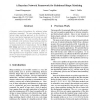Free Online Productivity Tools
i2Speak
i2Symbol
i2OCR
iTex2Img
iWeb2Print
iWeb2Shot
i2Type
iPdf2Split
iPdf2Merge
i2Bopomofo
i2Arabic
i2Style
i2Image
i2PDF
iLatex2Rtf
Sci2ools
102
click to vote
ICCV
2003
IEEE
2003
IEEE
A Bayesian Network Framework for Relational Shape Matching
A Bayesian network formulation for relational shape matching is presented. The main advantage of the relational shape matching approach is the obviation of the non-rigid spatial mappings used by recent non-rigid matching approaches. The basic variables that need to be estimated in the relational shape matching objective function are the global rotation and scale and the local displacements and correspondences. The new Bethe free energy approach is used to estimate the pairwise correspondences between links of the template graphs and the data. The resulting framework is useful in both registration and recognition contexts. Results are shown on hand-drawn templates and on 2D transverse T1-weighted MR images.
Bayesian Network Formulation | Computer Vision | ICCV 2003 | Non-rigid Matching Approaches | Non-rigid Spatial Mappings | Relational Shape Matching | Shape Matching Approach |
Related Content
| Added | 15 Oct 2009 |
| Updated | 15 Oct 2009 |
| Type | Conference |
| Year | 2003 |
| Where | ICCV |
| Authors | Anand Rangarajan, James M. Coughlan, Alan L. Yuille |
Comments (0)

